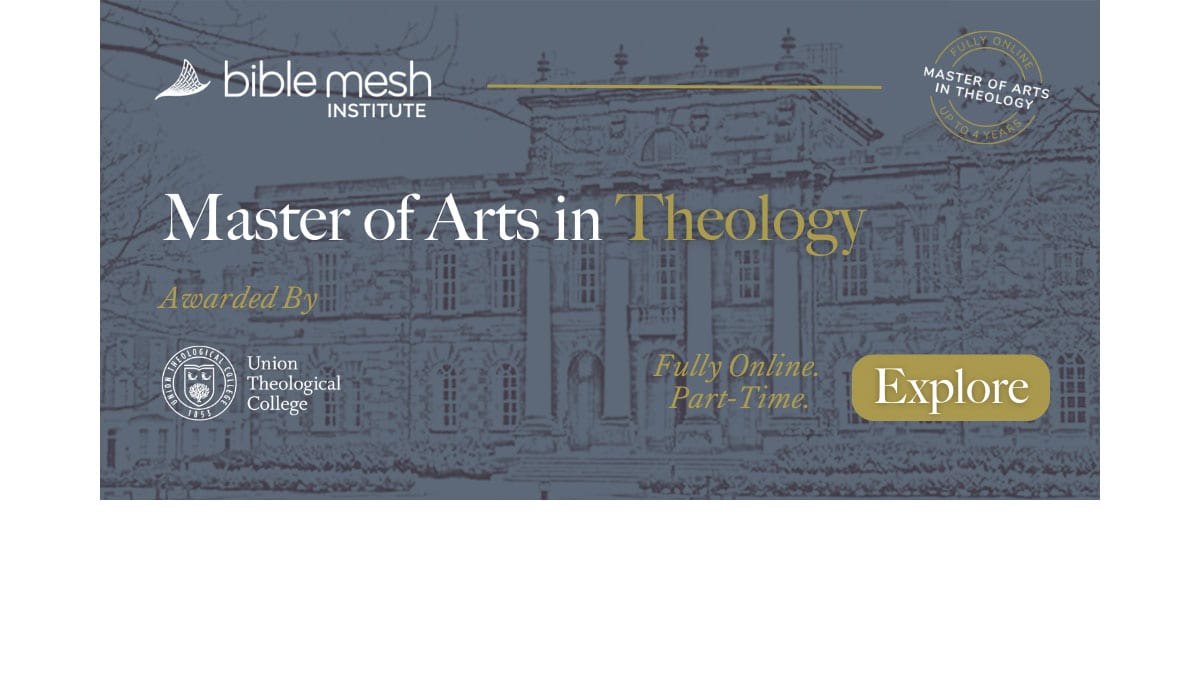Guest Post: Theological Retrieval in a Digital Age
Evangelicals Christians are well-known to be “people of the Book.” Our tradition is rooted in a high view of Scripture. As Protestants, we are staunchly committed to the conviction that the Bible is the sole normative authority for Christian faith and practice.
Such passion for the Bible, however, often verges on biblicism (see Barrett’s discussion on page 21). That is, the mentality that someone alone with their Bible is the preferred method for hearing God’s voice and following his ways.
While such biblicism on the surface professes deep faith in the authority and sufficiency of God’s Word, the shadow side of it is that it often fosters a resistance to an awareness of our historical rootedness. This is true especially in how we come to the task of interpreting God’s inspired Word.
When we read the text and move to interpret what it means and how it applies, we always interpret through the way we already see the world. This is because we are always shaped by the ideas and worldviews around us, as well as ones that have come before us. Every person comes to the text of Scripture with preconceptions about what is good and right, who we are, and what our place in the world is.
Scripture certainly needs to always form and reform us, but many of our desires and convictions are so far below the surface that we hardly notice how they affect our interpretation of Scripture. For those who exhibit an ahistorical just-the-Bible-and-me approach, however, this is all the more the case.
The Promise of Theological Retrieval
The good news is that evangelicals are increasingly aware of this dynamic. A promising recent trend in evangelical theology aims to correct for such an anemic awareness of the theological task. The movement of theological retrieval urges evangelicals to be intentional about how we come to the text, arguing that the wisdom of ages past should be actively resourced for the task of interpreting the Bible and doing theology today.
Additionally, the growing popularity in theological retrieval does not seem limited to a particular tradition or segment of church history. Patristic fathers like Irenaeus and Cyprian have witnessed just as much popularity as John of Damascus, Aquinas, Bonaventure, and Calvin. In general, this highlights an appetite to hear from the past as a whole, rather than going in search of one particular voice as a panacea to reinvigorate our theology today.
While there might be many reasons for this growing appetite to retrieve the voices of Christian tradition, no doubt our digital age and the explosion of easy access to not only the primary sources from different periods, but also their reception and contemporary discussion seems to be driving the movement.
Technology offers to connect us to the past like no other Christians have experienced in history. We would be wise to use this opportunity afforded us by virtue of living in the digital age. Yet the argument for the importance of theological retrieval ought not be just a pragmatic one. Certainly, it makes good sense to take advantage of the accessibility of the past.
But, more than that, the explosion of information in this era should actually impel us toward theological retrieval for the digital age. We need the past in order to keep our bearings, know ourselves, and hear more clearly the message of Scripture above the cacophony of voices we encounter every day.
So, let us look more closely at what exactly theological retrieval is, before considering how we might engage the past in and for a digital age.
What is Retrieval?
Properly understood, the task of theological retrieval is to consider the ways Christians throughout the ages have confessed the faith and to learn from their example. Attention to this dynamic of confession is helpful to understand how retrieval should function for our own processes of interpreting Scripture and theologizing.
The early church inherited from the apostolic fathers an understanding of the Christian faith as a particular confession, handed down from those who walked with Christ face to face. Jude wrote to James concerning “the faith that was delivered to the saints once for all” (Jude 3). Paul describes to the Corinthians the gospel as that which “I also received” (I Cor. 15:3), and he instructs Timothy “guard the good deposit” of the sound teaching he had passed onto him (I Tim. 1:14).
This confession served for the early church as a shorthand of the essential content of the faith. The regula fide (“rule of faith”) was a positive articulation, within the bounds of Scripture, of what it means to be baptized in the name of the Father, Son, and Holy Spirit. We might summarize it in no better way than as the theological explanation of Peter’s confession that Jesus is “the Messiah, the Son of the Living God” (Matt. 16:16). For in this confession is found all that Jesus said, “concerning himself in all the Scriptures” (Luke 24:27).
All of this indicates that from the very beginning Christians understood the faith as consisting of a particular content to be believed and confessed. The task of theological retrieval is to explore how this content of the faith was confessed by Christians in various times and places, in particular ways, and in response to the theological challenges they encountered.
It recognizes that while only the text of Scripture itself is inspired and normative for us, the degree to which Christians of the past faithfully confessed the message of Scripture offers us an example of the way Scripture was understood to speak to particular times and places. Thus, theological retrieval provides us with examples of how Christians have made the confession within the vernacular and worldview of that context. Such an example might inspire or instruct us as we likewise seek to confess the faith in our own context. Accordingly, through retrieval we come to see both the faith itself and how it has been believed in a new light.
But there is another vitally important role that theological retrieval plays in our theologizing. When we read the ways Christians have confessed the faith in the past, we are presented with a mirror to look back at ourselves through the values and worldviews of the past which are quite different from our own.
As Calvin famously says at the beginning of the Institutes, “Without knowledge of self there is no knowledge of God…Nearly all the wisdom we possess, that is to say, true and sound wisdom, consists of two parts: the knowledge of God and of ourselves” (1.1.1). Such knowledge, in part, comes through seeing ourselves afresh in the gaze of historical figures from entirely different contexts of the past.
When we read how Christians have approached the interpretation of Scripture, what they have believed about God and his relation to creation, the constitution of human beings and how we come to knowledge of him, and even the trajectory of the story of history God is telling, we encounter assumptions about life’s most basic things that we often take for granted. This helps us see ourselves, and especially the ways in which our own cultures deviate from others in different times and places, in a new perspective.
Thus, through theological retrieval we come to not only know the faith better, but also, we come to better know ourselves and what exactly we bring to the interpretive process.
Retrieval in and for a Digital Age
As we seek to articulate what Christians should believe and how the faith guides us to navigate the confusing age in which we live, theological retrieval offers wisdom from the past. In theory, we are more prepared now than in any other time in history to be able read and interpret Scripture in concert with the way Christians from varied places and times in history have read and interpreted it.
However, if we are blinded to the way our context shapes us with particular priorities and questions as we come to the text, we lose sight of the true need we have to resource the Great Tradition in our own age. Or even worse, without the voices of the Great Tradition guiding us, we come to the text itself imposing our own priorities and sentiments upon it.
Such is the reason why we so often look to the Old Testament for character studies that can show us how to defeat the giant struggles facing us in life, or why we read the book of Nehemiah solely as if it is a manual for Christian leadership skills. We think that Scripture speaks automatically to the needs we bring to it that we have inherited from our cultural context, and it speaks in exactly the way we demand that it does. It is no small wonder why, in a late-modern culture enchanted with the therapeutic understanding of the good life, that so many evangelical sermons and books on the Bible are marked by trying to find hidden life-hacks or secrets to a happy life in God’s Word to us.
We need theological retrieval to remember who and what we are as God’s creatures, even as we are adrift in an ever-churning sea of information. Considering the voices of Christians from times and places different from our own gives us a way of inhabiting the present tethered to a long tradition of Christians affirming and submitting to the voice of God in his written Word.
Conclusion
We have access to more resources today than ever before in history. But the ability to query dizzying amounts of information can be disorienting. Both the confession of the Word, who has spoken to us in history and given us the Scripture by his Spirit as a firm place to stand, and coming to know ourselves in reference to how Christians have confessed the Word offer us relief from the informational tempest.
That is why the work of collections like Theology on the Web are so important for Christians today. They make access to the Great Tradition both available and constructive for theological retrieval. Students, pastors, and scholars are well-served in mining the resources that have been preserved here.
Evangelicals need theological retrieval now more than ever. The challenges of the digital age should lead us to see that we need to converse with the Great Tradition constantly, not merely to remember the faith delivered once for all to the saints, but also to see and know ourselves aright as we come to the Scriptures to hear from God.
Dennis Greeson is dean of the BibleMesh Institute, where he teaches theology and develops programs to form students in being faithful to the Great Commandment, following the Great Commission, in conversation with the Great Tradition. BibleMesh offers students the opportunity to pursue undergraduate and graduate coursework in biblical and theological studies, in a flexible model, and with personal instruction from qualified scholars.





